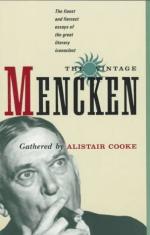
|
| Name: _________________________ | Period: ___________________ |
This test consists of 5 multiple choice questions, 5 short answer questions, and 10 short essay questions.
Multiple Choice Questions
1. How did Mencken describe the music of Puccini?
(a) "Two embalmers at work upon a minor poet."
(b) "Silver macaroni, exquisitely tangled."
(c) "A dozen wind chimes in a hurricane."
(d) "Two intertwined dogs yapping at each other."
2. What would best describe Mencken's attitude toward Oliver Wendell Holmes?
(a) His rulings were thoroughly corrupt.
(b) He was a Liberal hero in name only.
(c) He was a quack chiropractor.
(d) He was a fantastic advocate of progressive causes.
3. Why was early Christianity superior to modern Christianity, per "Holy Writ"?
(a) It featured a lot less sermonizing.
(b) It featured more moral instructions.
(c) Early Christianity had a less strict interpretation of Biblical stories.
(d) Services took place in cold places, to ensure better concentration.
4. What was the function of the Bill of Rights, per "Mr. Justice Holmes"?
(a) To ensure a pistol or shotgun is available in every household.
(b) To protect Americans from the tyranny of the state.
(c) To protect religion from devil worshippers.
(d) To protect the aristocracy from the low classes.
5. According to Mencken, how might Calvin Coolidge had handled the Great Depression?
(a) By sleeping through it.
(b) By nationalizing many sectors of the economy.
(c) By cowering under his desk.
(d) By taking a more active role than FDR ever had.
Short Answer Questions
1. Why did Mencken call democracy a "self-limiting disease"?
2. Per "Mr. Justice Holmes," which of the following might Mencken say about the legislature as a state organization?
3. What was the nature of the analogy Mencken uses involving Oliver Wendell Holmes, a hammer, and a feather?
4. Who were the two attorneys in the Scopes monkey trial?
5. What did Mencken call for in "Mencken's Last Stand"?
Short Essay Questions
1. Why did Mencken take issue with Oliver Wendell Holmes' final court case?
2. In "Exeunt Omnes," Mencken described his second book on death, which has collected sayings and thoughts on death. What did Mencken maintain was the main idea of the book?
3. How did Mencken distinguish between plutocracy and aristocracy in "A Glance Ahead"?
4. Why did Mencken miss corporal punishment in schools in "Travail"?
5. What examples did Mencken provide to support his judgment of Anglo-Saxons?
6. What was the content of "Sententiae"?
7. What was Mencken's opinion of stage acting?
8. According to "The Author at Work," why do writers write?
9. What did Mencken conclude about his research into the court cases of Oliver Wendell Holmes?
10. Why are artists "anti-patriotic," according to Mencken in "The Artist"?
|
This section contains 1,013 words (approx. 4 pages at 300 words per page) |

|




